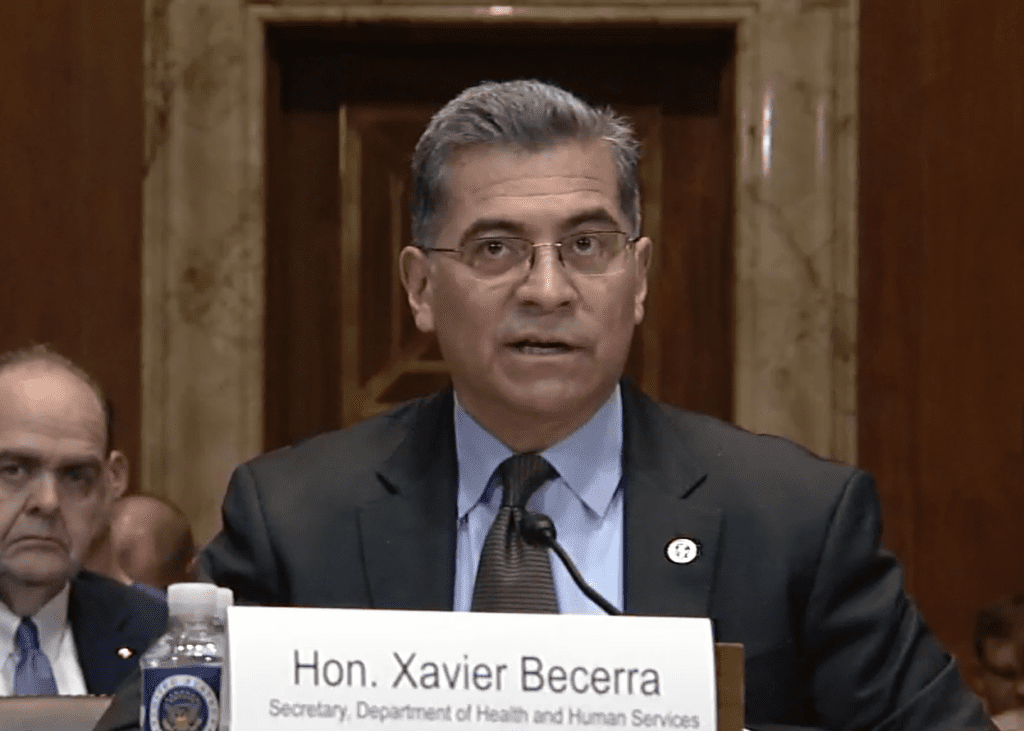Government policy impacting biotech—including drug price controls, pharmacy benefit managers (PBMs), accelerated approval, and support for new antibiotics—received a public airing this week when Health and Human Services (HHS) Secretary Xavier Becerra defended President Biden’s proposed 2024 health care budget in two separate Senate hearings.
Becerra faced tough questions Wednesday, March 22, in a morning hearing before the Senate Finance Committee followed by an afternoon hearing before the Senate Appropriations Committee subcommittee on health. The questioning is likely to be tough at the next hearing, the week of March 27, when Becerra testifies in the Republican-controlled House.
“The FY 2024 budget proposes $144 billion dollars in discretionary funding and $1.7 trillion dollars in mandatory funding to continue the work of the Department and make major investments in several critical areas,” Becerra said as he laid out budget priorities in his opening statement for the Finance Committee.
Drug price controls
Biden’s budget relies on Medicare and Medicaid price savings that he expects to achieve through expansions of drug price controls, a policy supported in statements by both Secretary Becerra and Finance Committee Chairman Ron Wyden (D-OR).
Ranking Committee Member Sen. Mike Crapo (R-ID) told the Finance Committee that the drug price controls included in last year’s Inflation Reduction Act (IRA) were already stifling innovation, as he and other Republicans opposed to the IRA had predicted.
“Already, numerous manufacturers have signaled plans to table certain projects in light of the uncertainty created by the IRA. In recent months, we have also seen a rash of drug shortages, which even leading U.S. Food and Drug Administration (FDA) officials have attributed to pricing dynamics,” Crapo said in his opening statement. “Doubling down on the IRA’s price controls would exacerbate the law’s most harmful consequences.
Sen. Thom Tillis (R-NC), who called the IRA the “investment reduction act,” said small-molecule drug research will suffer.
The impact of PBMs on prices
On the subject of PBM, there was agreement that there is need to make reforms to address their impact on prices.
Sens. Tom Carper (D-DE), James Lankford (R-OK), and Joe Manchin (D-WV) said PBMs drive up drug prices. Secretary Becerra said he supports PBM transparency in a new bill but anticipates legal challenges.
PBMs administer and manage drug benefits such as determining the formulary of drugs covered by insurers. Frequently, drug companies pay rebates to PBMs, which should be passed on to payors or patients, but research shows that’s not happening. That’s the impetus for the PBM Transparency Act.
On accelerated approval
Interference in the Food and Drug Administration (FDA) accelerated approval by the Centers for Medicare & Medicaid Services (CMS) was criticized by Crapo and Appropriations’ Susan Collins (R-ME), who said CMS is blocking access to vital drugs.
The FDA’s accelerated approval process permits “earlier approval of drugs that treat serious conditions, and that fill an unmet medical need,” according to the FDA. Last year, the CMS chose to limit coverage of the Alzheimer’s drug Aduhelm to patients enrolled in clinical trials, despite FDA’s granting the drug accelerated approval.
Becerra said that “the process FDA uses is different from the process CMS uses to make their decisions. As soon as CMS collects the evidence, or if FDA were to give standardized approval to the drug, they could broaden the scope of access.”
However, as the Biotechnology Innovation Organization (BIO) has previously pointed out to CMS, its recent decision on anti-amyloid monoclonal antibody treatments not only severely inhibits access to these important innovative therapies, but suppresses enrollment in clinical trials, making it even harder to complete confirmatory trials required by the FDA when it approved of these accelerated approval drugs.
Antimicrobial resistance and the PASTEUR Act
As Bio.News reported, developing new drugs for antimicrobial resistance is difficult, because market forces make it prohibitively expensive for drug developers to produce these drugs.
And yet, as Sen. Todd Young (R-IN) noted in the Finance Committee hearing, five of the 27 drugs facing penalties for price increases under the new IRA are designed to address antimicrobials. Becerra said that the response needed might be the kind of system described in the PASTEUR Act, which Young said he wants to try to pass in the current Congress.
Becerra will continue his testimony the week of March 27, when he testifies in the House, before the Ways and Means and Appropriations Committees and Energy and Commerce Health Subcommittee.




